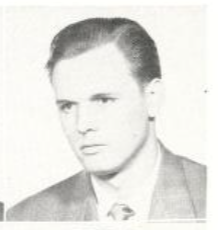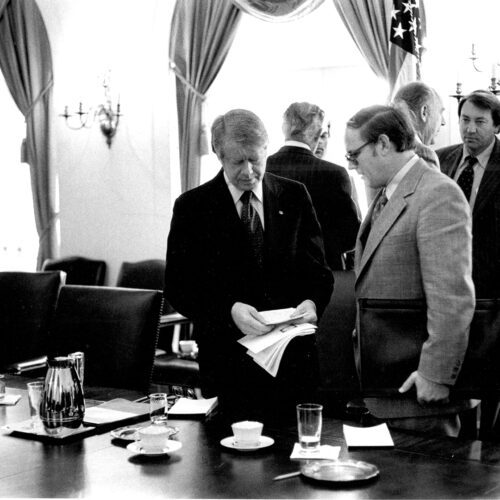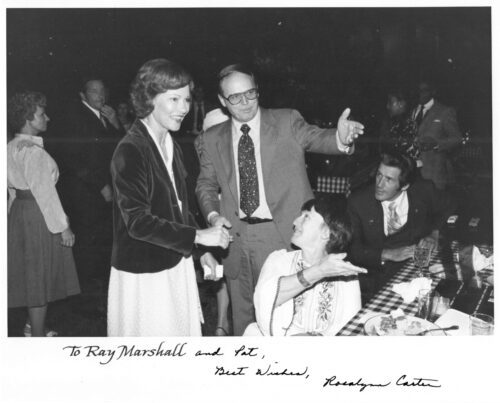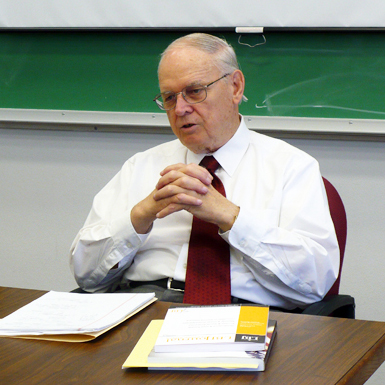Orphan, sailor, student, economist and United States Secretary of Labor – all phrases that have described Millsaps College alumnus Ray Marshall at some point in life.
Born in 1928 in Northern Louisiana, Marshall’s childhood was characterized by the turbulence of the Great Depression.
He grew up poor, moving to Mississippi when he was young. Marshall lost his mother at age 11 and was placed in the care of the Mississippi Baptist Orphanage, the institution he credits for instilling in him a love of learning that would eventually lead him to Millsaps.
 Following a stint in the Navy as a teenager, Marshall earned his GED and used the GI bill to enroll in community college before transferring to Millsaps to complete his degree.
Following a stint in the Navy as a teenager, Marshall earned his GED and used the GI bill to enroll in community college before transferring to Millsaps to complete his degree.
The liberal arts education is what drew him to Millsaps, and his experience did not disappoint. “I learned to appreciate all subjects: art, English, math, religion and philosophy,” he explained. “And the professors focused on teaching, not just research.”
At Millsaps, Marshall planned to attend law school and eventually become a politician. But he recalls James Troy Robison, his constitutional law professor, encouraging him to stay out of politics, saying “Life is hard for most people in Mississippi and the only fun they get is politics. They don’t want to hear all that stuff you want to talk about.” Marshall says that’s when he decided to become an economist.
Seventy-five years after graduating, he still fondly remembers his economics professors, Dr. Wallace and Dr. Berry, who prepared him for graduate school. His time in college wasn’t solely defined by academics; he enjoyed being a member of the Lambda Chi Alpha fraternity and the Economics Club.
 Marshall’s time at Millsaps was more than just a stepping stone – it was a foundation for his future. Marshall went on to Louisiana State University for his master’s degree and the University of California Berkeley for his Ph.D. But he said his time at Millsaps helped distinguish him from his peers.
Marshall’s time at Millsaps was more than just a stepping stone – it was a foundation for his future. Marshall went on to Louisiana State University for his master’s degree and the University of California Berkeley for his Ph.D. But he said his time at Millsaps helped distinguish him from his peers.
“Students were required to take three years of language classes at Millsaps. I took French,” he said. “When I got to Berkeley, some of my peers struggled with the language exams.” Marshall on the other hand easily passed, a success he largely attributes to Millsaps.
Little did Marshall know his undergraduate education would do much more than make him proficient in French; it would place him in the line of presidential succession.
In the years before Marshall received a life-changing phone call from then President-elect Jimmy Carter, he taught economics at universities across the South: the University of Mississippi, Louisiana State University, and the University of Texas at Austin. His intellect and leadership quickly earned him a reputation that would catch Carter’s eye.
In 1976, almost three decades after graduating from Millsaps, Carter tapped Marshall to be United States Secretary of Labor. He said “I felt good about it. I knew I was well equipped for the position.”

Ray Marshall with First Lady Rosalyn Carter
He recalls President Carter encouraging him to take a different approach to staffing than his predecessors. “He [Carter] asked me to expand my net to women and minorities, and then pick the best person for the job,” he explained. And that’s exactly what he did, selecting talented women and Black staffers to lead teams within the Labor Department.
There’s no question that Millsaps shaped Marshall’s intellectual and personal virtues. As Labor Secretary, he streamlined the Occupational Safety and Health Administration to better protect workers’ health and successfully led the charge to increase the minimum wage from $2.30 to $3.35 an hour. In a meeting with President Carter, Marshall recalls saying, “This is not an economic argument, it’s a moral argument. There are a lot of people out there who won’t get a raise unless we give it to them.”
 President Carter and Marshall’s time in public office was characterized by justice and integrity – two of Millsaps’ core values. In reflecting on the life and legacy of Jimmy Carter, Marshall said “He was deeply moral. Carter always did what he thought was right, not what was politically expedient.”
President Carter and Marshall’s time in public office was characterized by justice and integrity – two of Millsaps’ core values. In reflecting on the life and legacy of Jimmy Carter, Marshall said “He was deeply moral. Carter always did what he thought was right, not what was politically expedient.”
After Carter lost re-election, Marshall returned to teaching at the University of Texas at Austin, eventually retiring in 1998. Marshall’s career spans over four decades in academia but he knows serving as Secretary of Labor is a defining chapter in his life’s story. “It was the opportunity of a lifetime,” he said.
At no point in Marshall’s life was it ever lost on him that the roots of his success dug all the way back to Jackson, Mississippi where a small college left a big impact. That’s the Millsaps promise: past, present and future.
